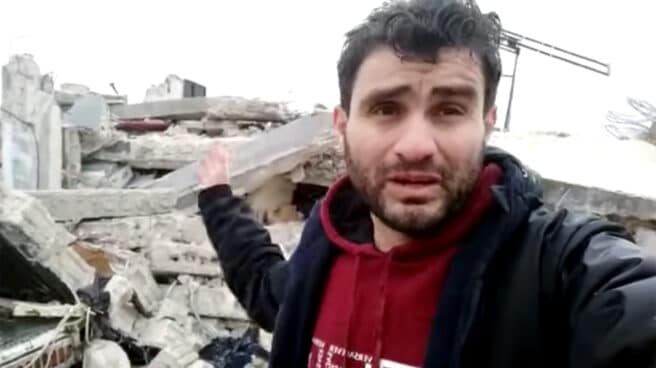

Abdulqafi Alhamdo, head of the Still I Rise program in northwestern Syria.
“This is the most severe earthquake we have ever experienced and we are receiving reports of many buildings being destroyed. This is a disaster,” says Abdulkafi Alhambo, in a video recorded in the Ad-Dana area, the director of Still Standing programs in northwestern Syria. Alhambo describes the desperation of the Syrians who, after 12 years of war and its devastating consequences, are faced with an earthquake of historical magnitude. The first earthquake of 7.8 on the Richter scale had 157 aftershocks, and a few hours later there was another second earthquake of 7.5. The number of victims is increasing by the hour: at least 1,498 people have already died in Turkey, and 751 people in Syria. The wounded and missing under the rubble number in the thousands.
If in Turkey the situation is bleak, where President Recep Tayyip Erdogan compared it to the one that was recorded in 1939, when 33,000 people died, then in Syria it is a drama of gigantic proportions. “There are many families under the rubble, and there is no one and nothing to save them. People are trying to help them by digging the ground with their hands,” Alhamdo explains. Many died in their sleep when the first major earthquake hit Turkey and Syria early in the morning.
“Buildings collapsed because they were very fragile. When they got here, they were built at random. Thousands will be buried under the rubble,” adds the program director of Still I Rise.
“Hospitals in northwest Syria are overcrowded and no longer accepting anyone. Many would have been saved if we had rescue teams and enough hospitals. Lonely. We have abandoned them in recent years. the entire international community. It’s devastating,” Alhamdo concludes in the video.
According to OCHA (United Nations Office for Humanitarian Affairs), 4.6 million people live in northwestern Syria, including 2.9 million internally displaced people, of whom just under two-thirds live in camps. Shelling, repression and armed conflicts did not stop, so that the surviving buildings are badly damaged.
“This earthquake is a natural disaster, but it exacerbates the destruction that northwestern Syria is in, making everything even more tragic. Due to the lack of infrastructure and the bombing of hospitals that have taken place over the years, social and medical support is virtually non-existent,” said Giulia Cicoli, Still I Rise Advocacy Officer. “It is too early to make a final estimate of the number of dead and injured, but, unfortunately, we are afraid of very large numbers. The situation in Syria is no longer news, it’s just that surviving it is becoming a daily challenge,” Cicoli adds.
The first earthquake was recorded at a depth of about 17.9 kilometers near the Turkish city of Gaziantep. In Syria, cities such as Aleppo in the north of the country were affected; Hama, 140 km south of the capital; o Latakia, in the west, Idlib also suffered. Tremors were noted in Lebanon, Israel, Cyprus and Greece.
Source: El Independiente